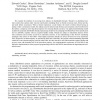Free Online Productivity Tools
i2Speak
i2Symbol
i2OCR
iTex2Img
iWeb2Print
iWeb2Shot
i2Type
iPdf2Split
iPdf2Merge
i2Bopomofo
i2Arabic
i2Style
i2Image
i2PDF
iLatex2Rtf
Sci2ools
119
click to vote
TECS
2010
2010
Recovering from distributable thread failures in distributed real-time Java
We consider the problem of recovering from failures of distributable threads (“threads”) in distributed realtime systems that operate under run-time uncertainties including those on thread execution times, thread arrivals, and node failure occurrences. When a thread experiences a node failure, the result is broken thread having an orphan. Under a termination model, the orphans must be detected and aborted, and exceptions must be delivered to the farthest, contiguous surviving thread segment for resuming thread execution. Our application/scheduling model includes the proposed distributable thread programming model for the emerging Distributed Real-Time Specification for Java (DRTSJ), together with an exception handler model. Threads are subject to time/utility function (TUF) time constraints and an utility accrual (UA) optimality criterion. A key underpinning of the TUF/UA scheduling paradigm is the notion of “best-effort” where higher importance threads are always favored ove...
Related Content
| Added | 31 Jan 2011 |
| Updated | 31 Jan 2011 |
| Type | Journal |
| Year | 2010 |
| Where | TECS |
| Authors | Edward Curley, Binoy Ravindran, Jonathan Stephen Anderson, E. Douglas Jensen |
Comments (0)

